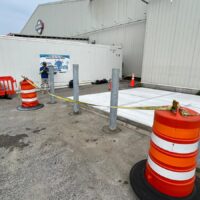Navigating the Concrete Path: The Role of the NYC DOT in Sidewalk Repair and Inspection
By edensidewalkrepair / / New York City, the bustling metropolis that never sleeps, boasts a vast network of sidewalks, stretching over 12,000 miles. These concrete pathways serve as the veins of the city, carrying millions of pedestrians daily. However, the constant wear and tear of this extensive infrastructure can lead to a multitude of sidewalk defects, posing safety hazards to pedestrians. To address these issues, the New York City Department of Transportation (NYC DOT) plays a crucial role in NYC Sidewalk Repair and inspection.
The NYC DOT’s Comprehensive Approach to Sidewalk Management
The NYC DOT’s responsibilities encompass a wide range of activities related to sidewalk maintenance. These include:Inspection and Violation Issuance:
NYC DOT inspectors regularly survey sidewalks throughout the city to identify and assess any defects. If a sidewalk is found to be unsafe, a Notice of Sidewalk Violation is issued to the property owner. This notice outlines the specific defects and provides a timeframe for repair.
Repair and Reconstruction:
For sidewalks in severely deteriorated condition, NYC DOT may perform the necessary repairs or hire a contractor to do so. This includes replacing damaged sidewalk flags, leveling uneven surfaces, and filling cracks and holes.
Property Owner Responsibilities:
While NYC DOT handles sidewalk repairs on City-owned property, property owners are responsible for maintaining sidewalks adjacent to their buildings.
This includes addressing minor defects and responding to Notices of Sidewalk Violations.
Prioritization and Funding for Sidewalk Repair
With over 12,000 miles of sidewalks to maintain, NYC DOT faces the challenge of prioritizing repairs. To address this, the department utilizes a comprehensive prioritization system that considers factors such as:Severity of Defects:
Sidewalks with more severe defects, such as large cracks or uneven surfaces, are given higher priority for repair.
Pedestrian Traffic:
Sidewalks in areas with high pedestrian traffic, such as schools, hospitals, and commercial districts, are prioritized to ensure the safety of a larger number of pedestrians.
Community Input:
NYC DOT also considers feedback from Community Boards and elected officials to identify sidewalks that require immediate attention.
To fund these extensive repair efforts, NYC DOT relies on a combination of sources, including:
Capital Budget:
The city’s capital budget allocates funds specifically for sidewalk repair and reconstruction projects.
Federal and State Grants:
NYC DOT actively pursues grants from federal and state agencies to supplement funding for sidewalk maintenance.
Property Owner Compliance:
When property owners fail to comply with Notices of Sidewalk Violation, NYC DOT may take legal action to collect the cost of repairs. These funds are then reinvested into sidewalk maintenance efforts.


